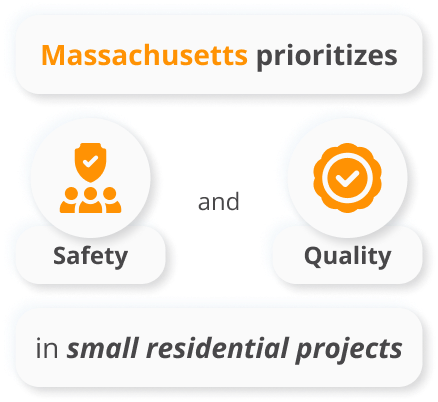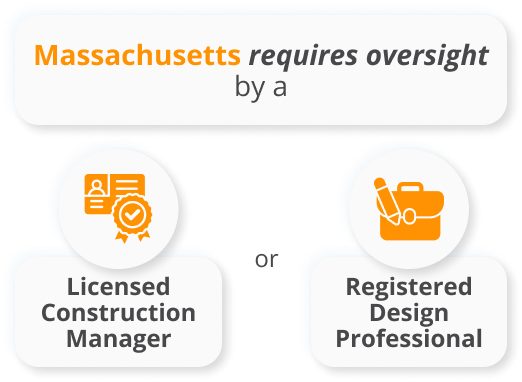Mastering Massachusetts Construction: Navigating Licensing and Insurance with Ease! Get Your General Contractor License in Massachusetts.
Massachusetts, known for its rich history and diverse architecture, significantly emphasizes the quality and safety of its construction projects. This commitment is evident in the state’s stringent requirements for licensed construction supervisors. These regulations ensure that every construction project, whether a quaint family home or a sprawling commercial complex, adheres to the highest standards of safety and craftsmanship.
For information on contractor licenses in Massachusetts, you can refer to the Massachusetts Office of Consumer Affairs and Business Regulation (OCABR).
Contact Information:
Web: Website: Massachusetts Office Affairs Business Regulation (OCABR)
Alternate Phone Number: 512-463-6599 (For calls outside Texas)
Alternate Phone Number: 512-463-6599 (For calls outside Texas)
Phone: 617-973-8787
Alternate Phone Number: 512-463-6599 (For calls outside Texas)
Alternate Phone Number: 512-463-6599 (For calls outside Texas)
Address:
Main Office: 1000 Washington Street, Suite 710,
Boston, MA 02118-6200
The OCABR website provides detailed information on contractor licensing, including requirements for home improvement contractors, exam details, insurance guidelines, and the application process.
Licensing for Small-Scale Residential Projects in Massachusetts
Massachusetts takes a meticulous approach to the construction and renovation of small-scale residential projects, including 1- and 2-family homes and their associated structures. This focus ensures that even the smallest construction projects meet the state’s high standards for safety and quality.
Requirements for 1- and 2-Family Homes and Appurtenant Structures
For these types of residential projects, Massachusetts law requires the oversight of a licensed construction supervisor or a registered design professional (RDP). This requirement is crucial for several reasons:
- Ensuring Compliance with Building Codes: Licensed construction supervisors are well-versed in the state’s building codes. Their expertise ensures that all construction activities, from foundation laying to roofing, comply with the established standards.
- Quality Assurance: These professionals bring a level of expertise and experience that guarantees the quality of the construction work. They are responsible for overseeing every aspect of the building process, ensuring that each phase is executed correctly and efficiently.
- Safety Oversight: The involvement of a licensed supervisor or RDP is key to maintaining safety on the construction site. They are tasked with identifying potential hazards and implementing measures to prevent accidents, thereby safeguarding workers and future residents.
The Necessity of a Licensed Construction Supervisor or RDP
The presence of a licensed construction supervisor or RDP is not just a regulatory formality but a fundamental aspect of the construction process in Massachusetts. Their role is to:
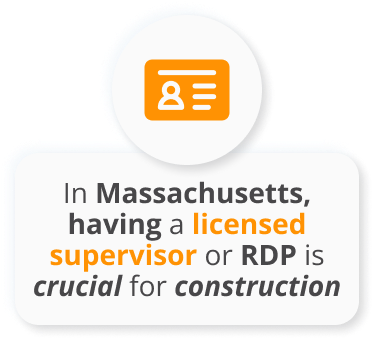
- Monitor Construction Progress: They ensure that the project adheres to the planned timeline and budget, making adjustments as necessary to keep the project on track.
- Coordinate with Other Professionals: In many cases, these supervisors collaborate with architects, engineers, and other specialists to ensure that the project’s design and execution align seamlessly.
- Handle Permitting and Inspections: They often take the lead in navigating the permitting process and are present during inspections to address any concerns raised by municipal building officials.
Regulations for Owner-Occupied Residential Buildings in Massachusetts
Massachusetts places a significant emphasis on the regulation and oversight of construction and renovation projects in owner-occupied residential buildings, particularly for 1- to 4-family homes. These regulations are designed to ensure the safety, quality, and compliance of construction work in these commonly inhabited structures.
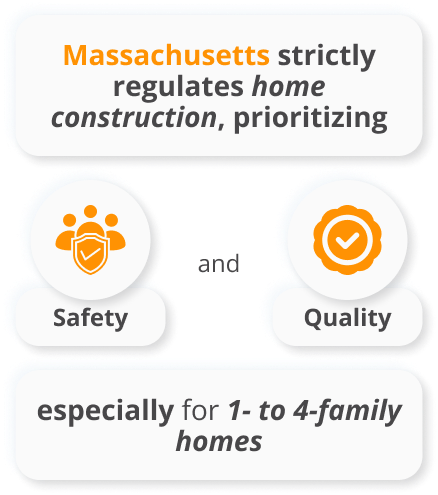
Licensing and Oversight Requirements
For most existing 1- to 4-family owner-occupied homes, the state mandates specific licensing and oversight requirements:
- Licensed Construction Supervisor or RDP Involvement: Similar to smaller residential projects, these larger, owner-occupied buildings also require the supervision of a licensed construction supervisor or a registered design professional (RDP). This requirement ensures that the construction or renovation work adheres to the state’s stringent building codes and standards.
- Focus on Structural Integrity and Safety: The involvement of these licensed professionals is particularly crucial in ensuring the structural integrity and safety of the building. They oversee critical aspects like electrical wiring, plumbing, structural alterations, and other significant modifications that could impact the building’s safety and functionality.
Dual Requirement: Licensed Supervisor and Contractor Registration
In addition to the need for a licensed supervisor or RDP, there’s a dual requirement for contractors working on these projects:
- Contractor Registration with the Home Improvement Program: Contractors must register with Massachusetts’ home improvement program. This registration is a testament to the contractor’s credibility and adherence to state regulations, providing an additional layer of consumer protection.
- Ensuring Consumer Protection: The home improvement program registration is designed to protect homeowners by ensuring that contractors meet certain standards of professionalism and financial responsibility. It also offers a recourse for homeowners in case of disputes or issues with the contractor’s work.
- Comprehensive Oversight: The combination of a licensed construction supervisor or RDP and a registered contractor ensures comprehensive oversight of the construction project. This dual requirement covers both the technical aspects of construction and the business practices of the contractor, ensuring a high standard of work and consumer protection.
The Crucial Role of Registered Design Professionals in Major Construction Projects in Massachusetts
In the realm of major construction projects in Massachusetts, particularly those involving buildings with over 35,000 cubic feet of enclosed space, the oversight and expertise of Registered Design Professionals (RDPs) become indispensable. This category typically includes large commercial buildings, industrial sites, and expansive public structures, where the complexity and scale of the project demand specialized oversight.

Key Aspects of RDP Involvement in Large Projects
- Mandatory Oversight by RDPs: For buildings exceeding the 35,000 cubic feet threshold, the state of Massachusetts requires the supervision of a Registered Design Professional. This includes licensed architects and engineers, whose expertise is crucial for managing the intricate aspects of large-scale construction.
- Comprehensive Role of RDPs: The responsibilities of RDPs in these projects are extensive. They oversee the entire project from design to execution, ensuring structural integrity, adherence to detailed architectural plans, and compliance with all applicable building codes.
Exemption of Construction Supervisor License in Large Projects
In these larger projects, the role typically assigned to a construction supervisor is instead fulfilled by an RDP due to:
- Project Complexity: The intricate nature of large-scale projects demands the specialized knowledge and skill set of RDPs, which goes beyond the scope of a standard construction supervisor.
- All-Encompassing Oversight: RDPs offer a holistic approach to project management, covering both the design and construction phases. Their expertise is crucial in navigating the complex challenges presented by large-scale constructions.
- Ensuring Regulatory Adherence: RDPs are pivotal in ensuring that the project meets all the stringent building codes and regulations, which are often more complex for larger structures.
The Significance of RDPs in Major Construction Endeavors
The involvement of RDPs in large-scale construction projects in Massachusetts is a testament to their vital role in ensuring the safety, functionality, and compliance of major building endeavors. Their expertise not only guides the project through its various phases but also ensures that the final structure stands as a testament to quality and regulatory adherence.
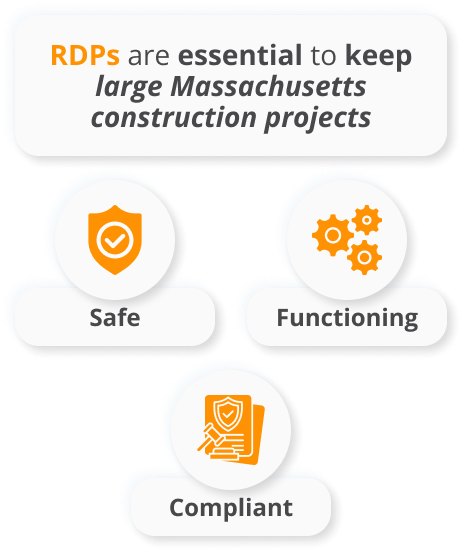
Local Licensing Requirements and Compliance in Massachusetts: Important Subject for General Contractor Licensing in Massachusetts.
In Massachusetts, the construction landscape is governed not only by state-level regulations but also by specific local ordinances. Understanding and adhering to these local licensing requirements is crucial for the successful execution of construction projects. This section delves into the significance of liaising with municipal building officials and how local regulations can influence construction endeavors.

Importance of Local Regulations:
Massachusetts municipalities may have specific licensing and building codes, impacting the safety, environmental, and aesthetic aspects of construction.

Project Compliance:
Engaging with local building officials is crucial for aligning construction projects with local ordinances, avoiding legal issues and delays.

Permit Acquisition:
Local officials are key to obtaining necessary construction permits.

Design and Execution Influence:
Local rules can affect project design, including building heights, materials, and color schemes.

Environmental and Safety Considerations:
Municipalities might enforce stricter environmental or safety standards, like energy efficiency or waste management.

Historical and Zoning Compliance:
Areas with historical significance or specific zoning laws require adherence to additional regulations.

Contractor Responsibilities:
Contractors need to be well-informed about state and local regulations, collaborate with authorities, and adapt to the unique requirements of each municipality.
Insurance Requirements for General Contractor License in Massachusetts
In Massachusetts, the requirements for obtaining a general contractor license and the necessary insurance are pivotal for maintaining the integrity and safety of the construction industry. This section provides a comprehensive overview of these requirements, highlighting their importance in ensuring responsible business practices and consumer protection.
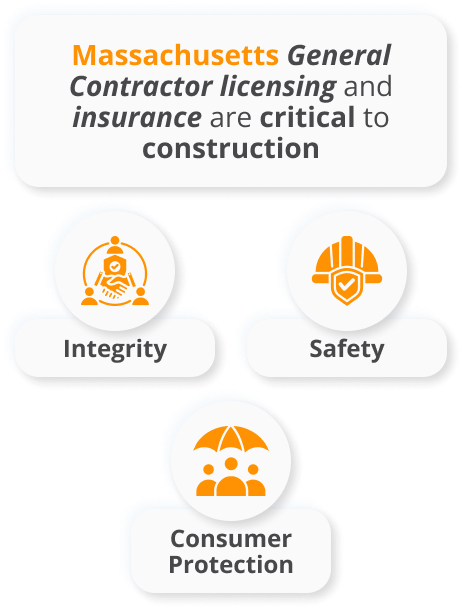
General Contractor License Requirements in Massachusetts
- Eligibility Criteria: To be eligible for a general contractor license in Massachusetts, applicants must meet certain age and experience requirements. They should be at least 18 years old and possess a combination of education and hands-on experience in the construction field.
- Educational and Experience Prerequisites: Depending on the license type, applicants may need to have completed specific educational courses or apprenticeships. Additionally, a certain number of years of practical experience in construction or a related field is often required.
- Examination: Applicants are typically required to pass a licensing exam that tests their knowledge of building codes, construction practices, and safety regulations.
- Background Checks: A criminal background check is usually part of the application process to ensure the applicant’s good moral character and reliability.
- Application Process: The process involves submitting a detailed application, which includes proof of experience and education, along with the necessary fees.
Insurance Requirements for General Contractors
- General Liability Insurance: This is a fundamental requirement for general contractors in Massachusetts. It protects against claims of property damage or bodily injury caused by the contractor’s operations. The coverage limits vary depending on the project’s size and nature.
- Workers’ Compensation Insurance: For contractors with employees, workers’ compensation insurance is mandatory. This insurance provides coverage for medical expenses and lost wages if an employee is injured on the job.
- Professional Liability Insurance: While not always mandatory, this insurance is crucial for protecting against claims of negligence or errors in the professional services provided.
- Vehicle and Equipment Insurance: For contractors who use vehicles and heavy equipment, appropriate insurance coverage is necessary to cover any damage or accidents involving these assets.

Significance of Insurance in the Construction Industry
- Risk Mitigation: Insurance plays a critical role in mitigating the various risks associated with construction projects. It provides a safety net for both the contractor and the client.
- Client Confidence: Having the appropriate insurance coverage can enhance a contractor’s credibility and trustworthiness in the eyes of clients and partners.
- Legal Compliance: Adhering to insurance requirements is not only a best practice but often a legal necessity. It ensures compliance with state regulations and industry standards.
- Financial Protection: Insurance protects contractors from potentially devastating financial losses due to accidents, lawsuits, or unforeseen events.
Frequently Asked Questions (FAQ)
These are common questions about General Contractor License in Massachusetts.
In Massachusetts, a Construction Supervisor License is required for overseeing 1- and 2-family homes and appurtenant structures of any size, most existing 1- to 4-family owner-occupied homes, and buildings less than 35,000 cubic feet of enclosed space.
An RDP, either an engineer or architect, is required to oversee the construction of buildings greater than 35,000 cubic feet. They are considered the licensed individual for these larger projects.
Yes, it’s important to check with the municipal building official in the city or town where the project is located for any additional licensing requirements.
General contractors must have General Liability Insurance, Workers’ Compensation Insurance if they have employees, Professional Liability Insurance, and Vehicle and Equipment Insurance.
Insurance coverage limits, especially for General Liability Insurance, may vary depending on the size and nature of the project. Larger projects typically require higher coverage limits.
While not always mandatory, Professional Liability Insurance is crucial for protecting against claims of negligence or errors in the professional services provided.


